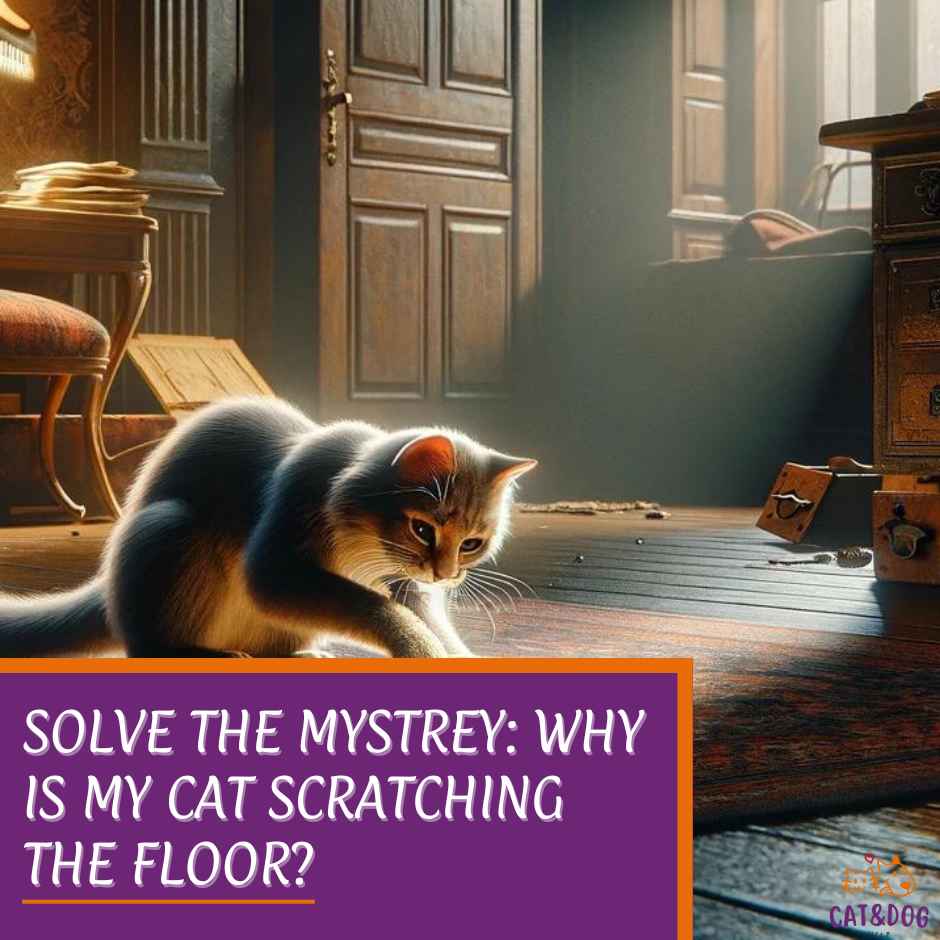If you’ve ever caught your feline friend obsessively scratching at the floor, you might be scratching your head too, wondering why they’re suddenly taking out their energy on your hardwood or carpet. (1)
It may seem odd or even irritating, but for cats, this behavior is rooted in instinct and serves several important purposes, both for their physical and psychological needs.
From marking territory to keeping their claws in tip-top shape regularly, a lot is going on with those vigorous paw motions, similar to those of big cats. Image Credit: Mik ulyannikov, Shutterstock.
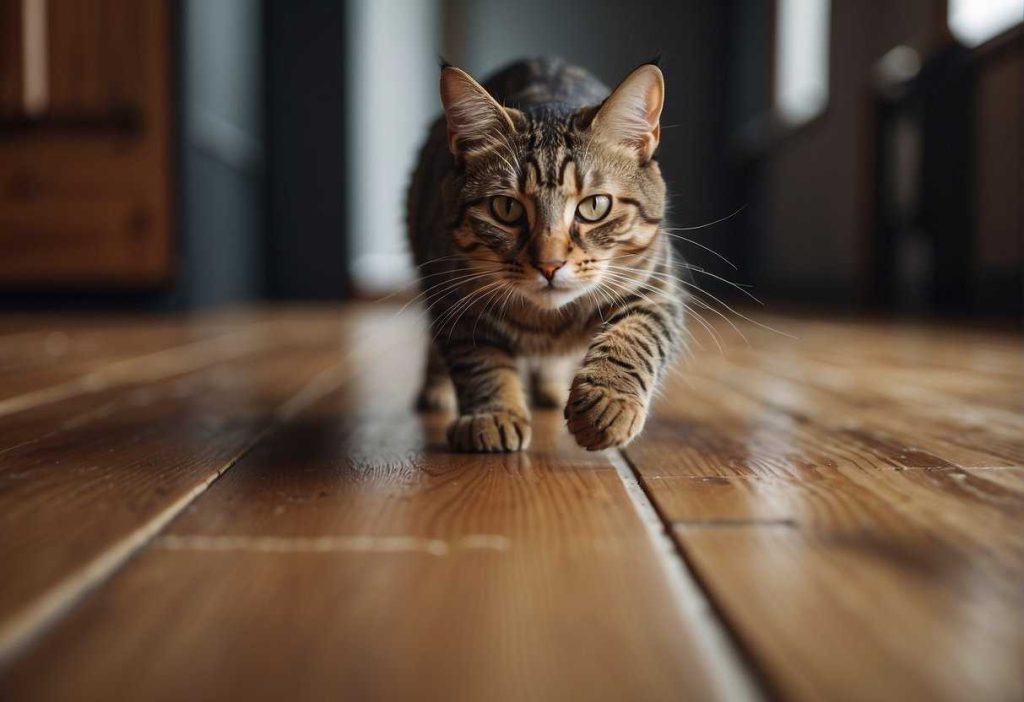
Sometimes you’ll notice scratching near the litter box, which could indicate a critique of its cleanliness or size. Other times, it might be a clear signal that your kitty is seeking more attention and knows just how to get it.
Understanding the variety of reasons can help you address the floor scratching constructively, without resorting to a spray bottle or sticky tape.
Before calling in the pros or worrying about their well-being, consider the simple explanations behind this common cat conundrum, such as the height of the litter tray or the presence of feces outside of the litter box.
After all, cats will be cats, and with a bit of insight from Catster, you and your furry pal can live in harmony – scratch-free floors included.
Key Takeaways
- Scratching is a normal, instinctual behavior for cats that assists in marking territory and maintaining their claws.
- Misconceptions about scratching often lead to unnecessary concern, but understanding its purpose can ease your mind.
- Properly managing your cat’s scratching habits can strengthen your relationship and promote their well-being.
Delving Deeper into, Why Is My Cat Scratching the Floor?
The Psychology Behind Floor Scratching
- Your kitty’s paws are like their business cards, depositing their unique scent via glands on their footpads. It’s their way of saying, “I was here!”
- That relentless scratching might also be their way to cope with stress or anxiety. Kinda like how we might bite our nails—it releases tension.
- Stress triggers can vary a new pet, changes in the environment, or health issues. Keeping tabs on any shifts can clue you in.
Interpreting Your Cat’s Body Language
- Vigorous floor scratching after using the litter box? They’re not critiquing your cleaning skills—cats instinctively cover their waste to avoid attracting predators or rivals.
- If the scratching tour extends beyond the litter box, your cat might be staging a protest, signaling that it’s time for a clean-up.
- Notice scratch-a-thons near doors or windows? Your cat could be sending a “keep out” memo to other neighborhood felines.
Remember, cats are creatures of habit. Changes like a new feeding schedule or an inconsistent routine can throw them off their game.
And don’t forget playtime! Exercise is crucial, not only for their physical health but also for keeping those claws busy with toys instead of your floor.
If the scratching seems excessive or you just have that gut feeling something’s off, a vet visit might be in order. It’s always better to play it safe, especially when it comes to your cuddly companion’s wellbeing.
Keep an eye on their grooming patterns and health history for any clues.
So next time your kitty goes to town on your floor, take a moment to observe. What might seem like a quirky habit can be a wealth of information about their needs and feelings.
It’s just another way our feline friends communicate in their mysterious, whiskered ways!
Strengthening Your Relationship with Your Cat
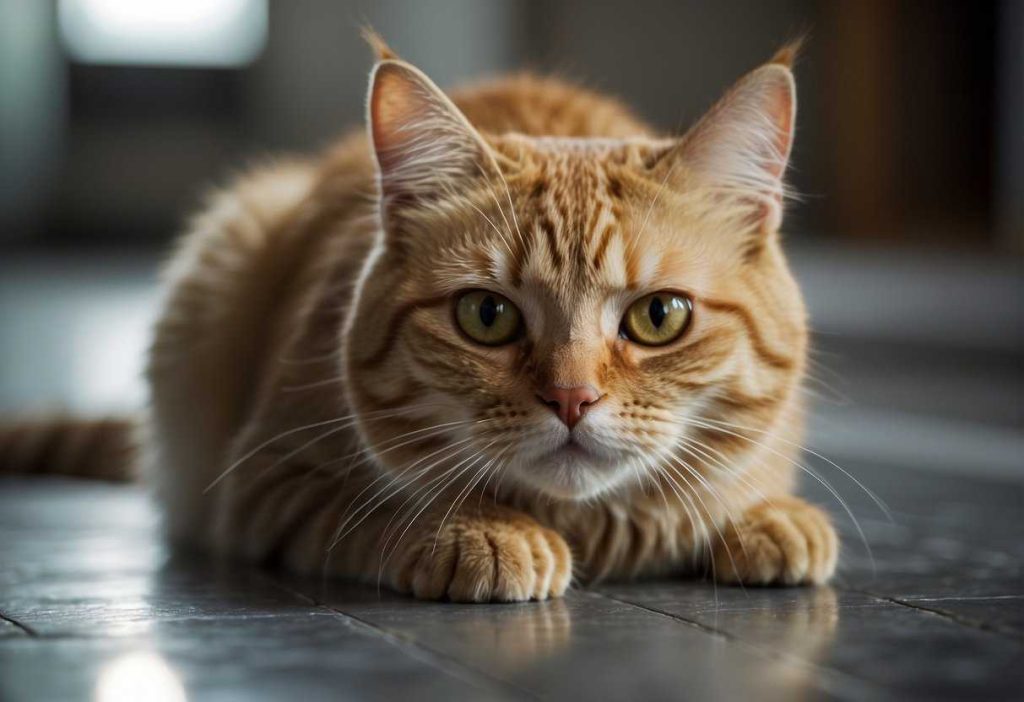
When your cat scratches the floor, it might be trying to communicate or feel comfortable in its territory. Here’s how you can understand this behavior and bond with your furry friend.
Avoiding Actions That Stress Your Cat Cats can be sensitive creatures. Little things might nudge their stress-o-meter higher:
- Ignoring their space needs: Like humans, cats need their “me time”. Ensure they have a quiet retreat.
- Overlooking the litter box: A clean, spacious litter box is a must. It’s their throne, after all!
- Sudden changes: Cats are creatures of habit. Introduce new pets or routines gradually. (2)
Fostering Positive Interactions Building trust and creating a strong bond with your cat involves simple, daily interactions:
- Regular play sessions: Grab that laser pointer or feather wand. Play is a great stress-buster!
- Routine grooming: Cats love to be clean. Gentle brushing can be very relaxing.
- Learning their language: Tail swishes and ear flicks have meanings. Observation is key! (3)
Remember, scratching might be about keeping those claws in tip-top shape or making their presence known. By providing scratch-friendly surfaces, you communicate that you understand their needs.
You’ll see their stress and anxiety levels drop, making room for more chill vibes and purrs.
Engaging with your cat during these scratch sessions can turn into bonding moments. Offer a cheek rub or a treat when they use their scratch post instead of your floor.
Soon, you might just notice your kitten seeking you out, not just for play, but for comfort too. Isn’t that the heartwarming connection we cat owners treasure?
Practical Tips and Solutions for Managing Scratching
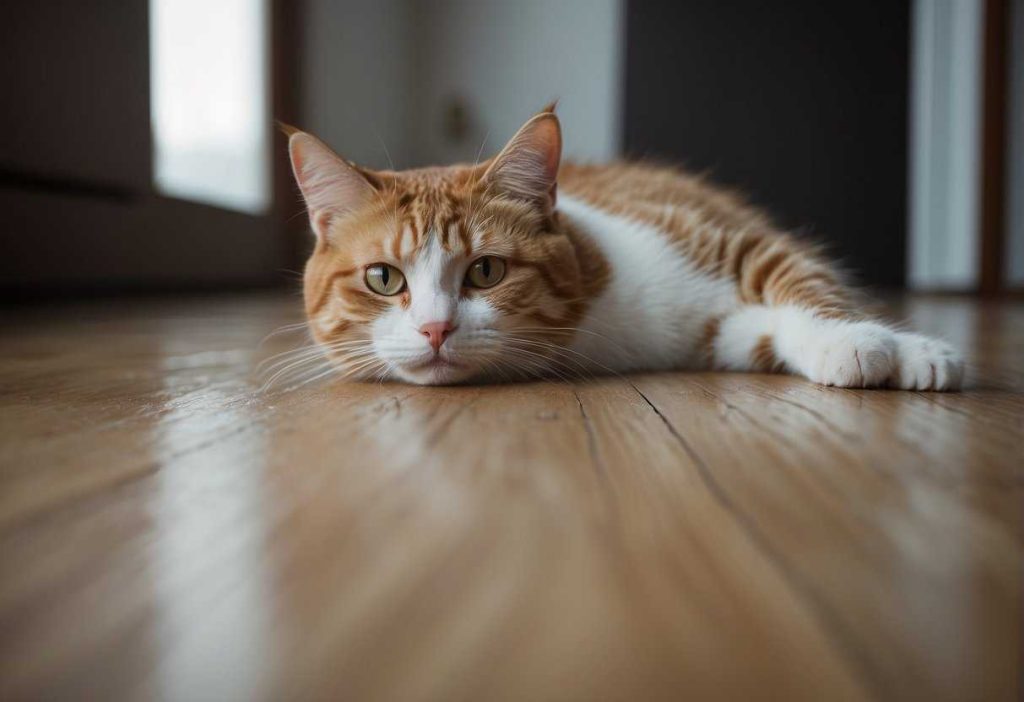
Creating a Cat-Friendly Environment
- Give your feline friend a scratching post or two. Cats adore stretching and scratching, so invest in posts with materials they love—sisal and cardboard are great!
- Mix up the textures! Cats can be picky, so offer a variety of scratching surfaces to see which they go wild for.
- Place scratching posts in different areas around the house. Cats often scratch to mark their territory, so let them stake their claim in multiple spots. (4)
Corrective Behaviors and Training
- Redirect that energy! When your cat starts eyeing the floor, gently lead them to a scratching post and show how it’s done.
- Praise goes a long way. Shower your furball with love when they use the scratching post instead of the floor.
- Keep those claws in check! Regular trimming can lessen the damage they can do when they forget the rules.
Don’t Forget to Play and Exercise
- Get those paws busy with interactive toys! A regular playtime schedule gives your cat a positive outlet for their energy and reduces the urge to scratch.
- Bring on the hunt! Simulate the chase with toys that encourage pouncing, stalking, and leaping, keeping your cat’s body and mind sharp.
Remember, with a touch of patience and some trial and error, you’ll find the perfect balance between your cat’s instincts and the state of your home.
Keep at it, and soon that scratching will just be part of playtime, not a flooring concern!
Incorporating Humor and Relatability into Cat Care
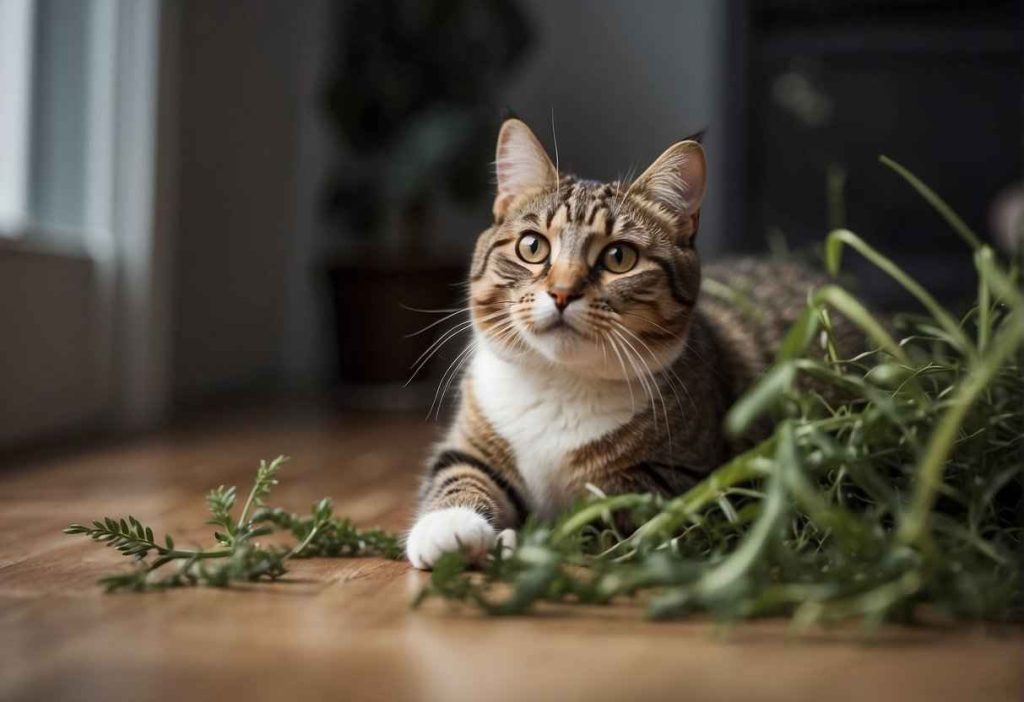
When you catch your cat treating your pristine floors like their personal manicure mat, it’s hard not to wonder what’s going through their little feline minds. Cats and their scratching—it’s a tale as old as time.
- Ever seen your cat glance at you, have the daring in their eyes, then go right back to scratching the floor? They’re asserting their cattitude, marking their territory, and yes, giving you something to post about on social media.
- Scratching is like yoga for cats. Watch as they stretch and dig in, giving themselves a full-body workout. It’s the latest meowga trend!
Switching to a shared struggle, ever scrolled through a pet forum at 2 AM, desperate for a solution to protect your floors?
- That moment when you place a new scratching post, and your cat gives it a sniff only to return to their favorite spot on the floor—yeah, welcome to the club!
Let’s talk strategies. How about those deterrents? Sprinkle a little bit of double-sided tape or aluminum foil around their preferred floor spot—it’s like a no cat’s land!
- Aluminum foil or mats: because a cat’s first encounter with sticky paws or the sound of foil is a dance you won’t forget.
Positive Reinforcement: the gentle art of convincing your cat that the actual scratching post is the love of their nine lives.
- A smidge of catnip on the sisal rope post or a swift reward with their favorite treats can make a difference. Just remember, when it comes to cats, bribes are just part of the deal.
- Pheromone diffusers like Feliway? They’ve been known to calm the savage beast… or at least the domestic cat keen on redecorating your floors.
And for those who prefer the soft approach, there are always nail caps—tiny hats for claws, because who says you can’t accessorize while cat-proofing?
In the cat’s kingdom, you’re at their service. But a bit of humor and creativity may just save your floors and your sanity.
Just remember, while you’re crafting those deterrent tactics, it’s all about the love for your quirky, claw-happy companion.
Prioritizing Your Cat’s Health and Well-being
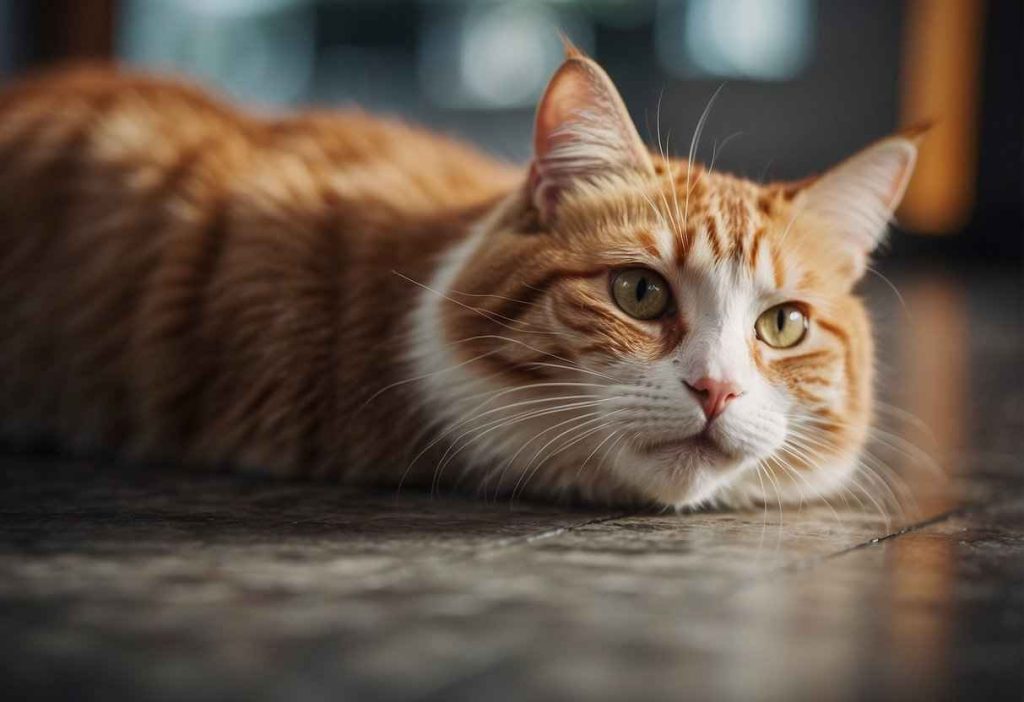
Scratching isn’t just a hobby for them, you know—it’s a behavior deeply rooted in their well-being!
Impact of Environment on Cat’s Mental Health
- Your cat’s living space is their kingdom, and like any good realm, it should offer comfort and stimulation.
- A cozy nap spot away from high traffic might just be the perfect haven for a cat nap.
- Interactive playtime with you? Yes, please! Cats thrive on attention and play to shoo away the blues. (5)
On the flip side, if their territory feels threatened or lacks stimulation, your furry overlord might turn to scratch to cope with stress.
Don’t make them stress-knead their days away—let’s create a positive space for them!
Nutritional and Physical Health Tips
- Feeding your cat a balanced diet is top-tier pet parenting. Check with your vet for the best nibbles tailored to your fluffball’s health history.
- Think of cat food as fuel; the right diet fuels playful romps and purrfect health. (6)
- Regular vet visits are a non-negotiable. Staying on top of health screenings helps catch sneaky health issues early.
- And don’t forget to be their workout buddy! Engaging in daily play keeps your pawsome pal agile and sharp-clawed.
So, when it comes to stress and anxiety, remember that your love and thoughtful care are the best prescriptions. Keep their world fun and fulfilling, and those floor murals will be a thing of the past! 😺
When to Seek Professional Help
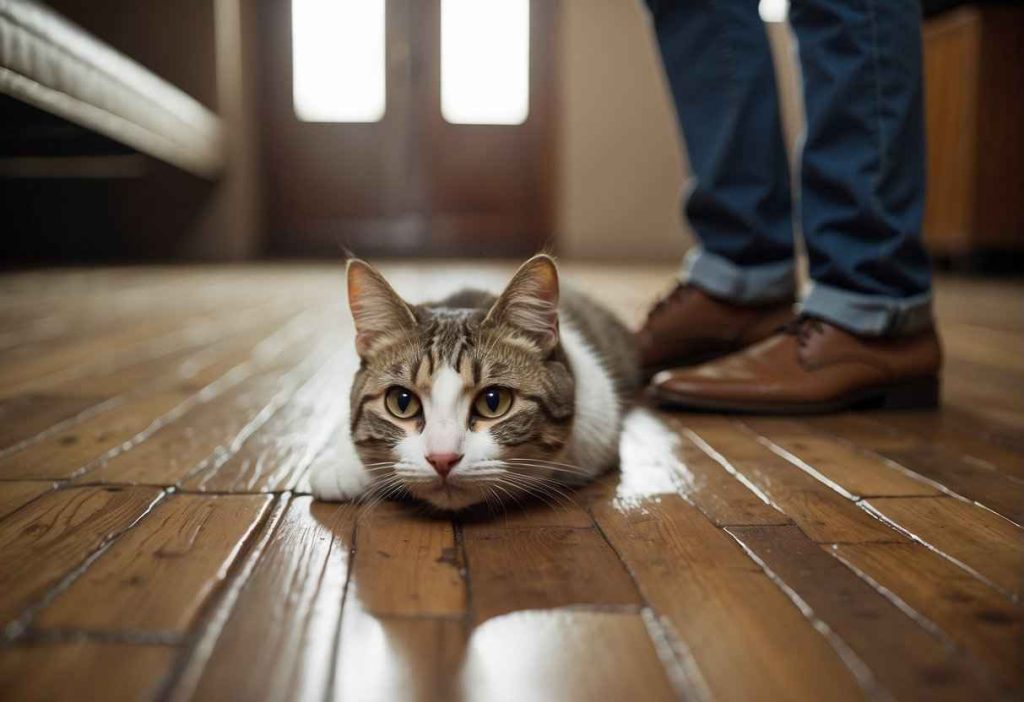
It’s crucial to know when this behavior crosses the line from quirky to concerning.
- Persistent Scratching Despite Changes: If you’ve already tried adjusting your environment and nothing has changed, it might be more than a simple habit.
- Physical Harm: Are your cat’s paws looking worse for wear? Over-scratching can lead to raw or bleeding paws.
- Change in Behavior: A sudden increase in scratching, especially if accompanied by other changes in behavior, merits a deeper look.
Scratching can sometimes be a cat’s way of saying, “Hey, I need help!” So, when should you seek that help?
- Unresolved Issues: Your DIY solutions haven’t made a dent in the scratching spree.
- Intensifying Behavior: What started as an innocent scratch could escalate into a full-blown feline frenzy.
Seeking professional help isn’t a defeat; it’s a smart move for your cat’s well-being. Now let’s consider who to turn to:
- The Vet Connect: Begin with a visit to your veterinarian. Sometimes, physical discomfort can manifest as excessive scratching.
- Feline Behaviorists to the Rescue: These are like the cat whisperers of the pet world, trained to decode peculiar pussy-cat patterns.
When staring down the endless abyss of scratched floors, remember, that there’s a squad of experts out there just waiting to lend a hand (or paw). Why not reach out before your home turns into a giant scratching post?
Quick Recap
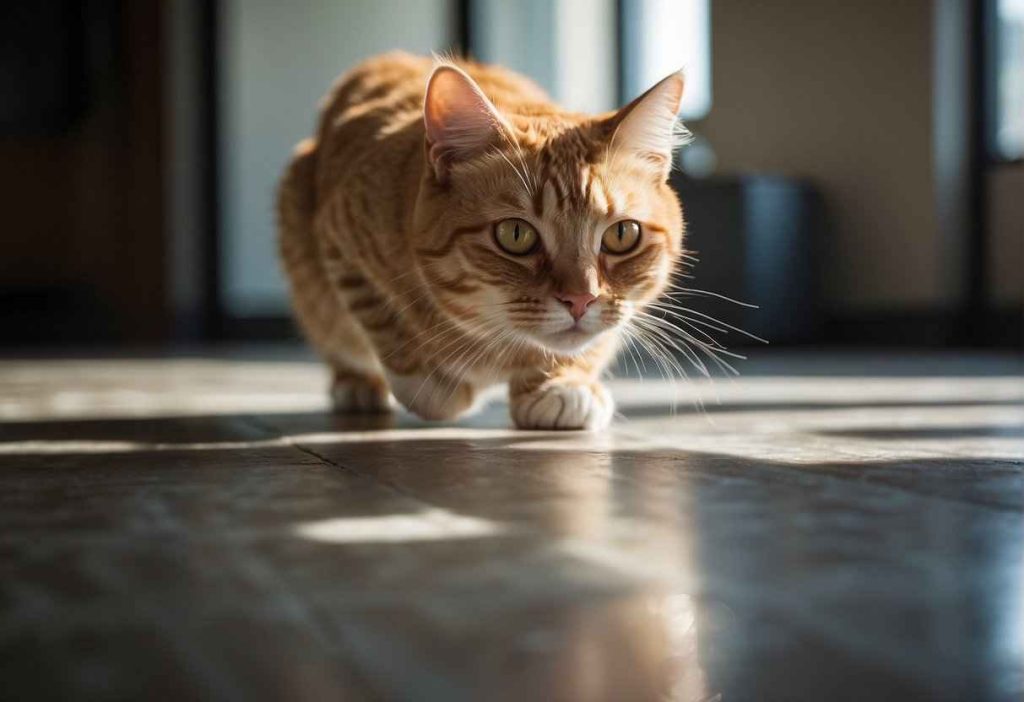
Why does your furry friend scratch the floor? Let’s quickly go over the insights:
- Litter Box Issues: Just like you appreciate a clean and spacious bathroom, your cat does too! A dirty or cramped litter box can result in floor-scratching protests.
- Scent Marking: Remember, your cat’s paws have scent glands, and scratching the floor is their way of saying “I was here!”—a bit like leaving a sticky note on the fridge, but more primal. (7)
- Attention-Seeking: Yes, your cat knows how to get your attention. If scratching the floor brings you running, they might just keep doing it for those extra head scratches.
- Boredom or Stress: Cats need stimulation and without it, they might turn to scratching—that’s their version of doodling when bored in a meeting.
- Ancestral Instincts: Imagine your cat’s ancestors in the wild; scratching is part of their natural behavior, an echo of their past.
Wondering how to become the best cat companion?
Empathy: Understanding the ‘whys’ behind your cat’s behavior is the first step. Be empathetic—they’re not out to ruin your floors, they’re just being cats.
Continuous Learning: Stay curious about feline antics. The more you learn, the better you can care for your whiskered roommate.
Patience is Key: Developing a loving relationship with your cat will take time and patience, but it’s oh-so-rewarding when you get those purrs and nuzzles.
In essence, your cat’s floor-scratching habits are a combo of hygiene, communication, mental needs, and instinctive behavior.
Remember, a little patience and understanding go a long way in addressing this potentially harmful behavior.
Keep an eye out for signs, create positive outlets for their natural behaviors, such as kneading, and maybe invest in a scratching post or two. Your floors (and your cat) will thank you!
Frequently Asked Questions
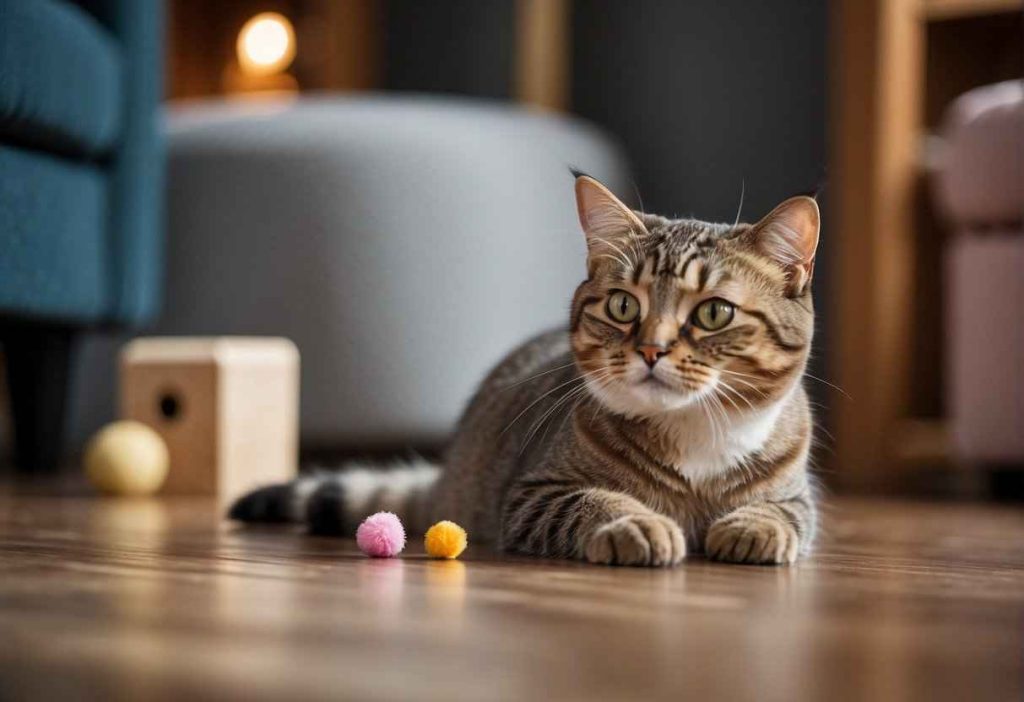
Curiosity piqued about your feline friend’s floor-scratching antics? We’ve got the scoop on those mysterious behaviors and some tips to save your floors.
Why is my cat scratching the floor all of a sudden?
Your kitty might’ve discovered a new texture they adore or there could be changes in their environment triggering this.
It’s worth watching to see if it’s a one-off quirk or an emerging habit.
Can floor scratching be a sign of a health issue?
Yes, sometimes compulsive scratching can signal discomfort or a health problem.
If your cat’s relentless with their floor work and is showing other odd signs, a vet visit could be in order.
How can I stop my cat from scratching the floor without causing stress?
Gently redirect their energy! Provide enticing scratching posts or mats that draw their attention away from the floor.
Positive reinforcement when they scratch appropriately can work wonders too.
What are the best scratching post alternatives to prevent floor scratching?
Consider sisal-covered posts, corrugated cardboard scratchers, or even a sturdy piece of natural wood.
Each offers a unique texture that your cat may find irresistible compared to your floor.
Is my cat scratching the floor due to boredom?
It’s totally possible! Cats need stimulation, and scratching might be their way of saying life’s a bit too dull.
Interactive toys and playtime can channel their energy into more exciting ventures.
How does stress influence my cat’s scratching behavior?
Stressed kitties often scratch to soothe themselves and mark their territory with scent from their paw pads.
Keep an eye out for changes that may be stressing them out, like new pets or rearranged furniture.
- Free Online Casino Games: What You Need to Know - July 26, 2025
- Ideal Casinos Mobile: The Ultimate Guide to Mobile Betting - July 26, 2025
- The Ultimate Overview to Casino Site Gamings Online - July 26, 2025

